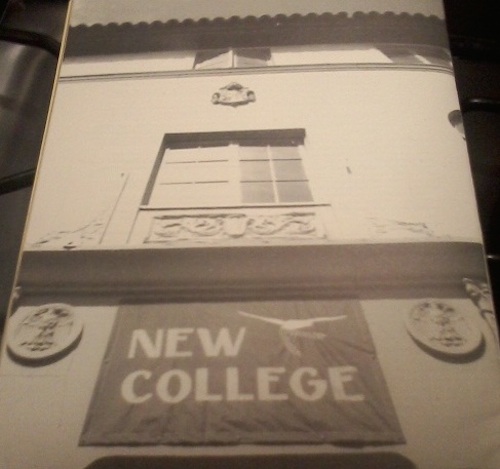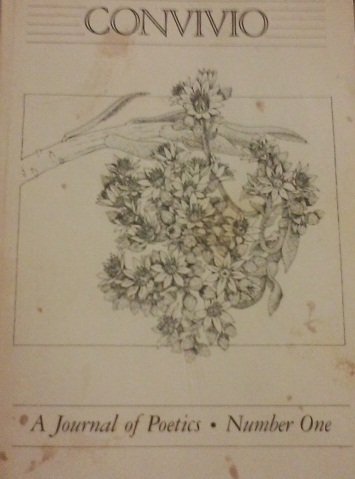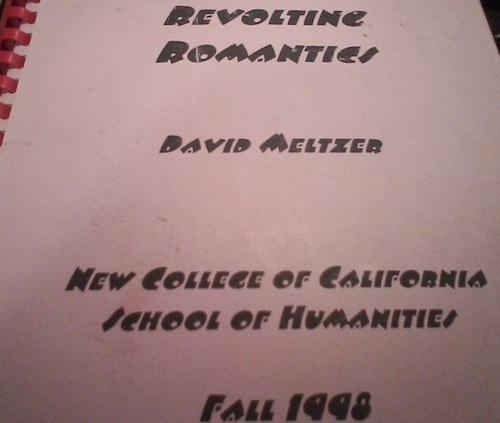T H E D I S T A N C E S and / or C I T I E S (6)

I arrived in San Francisco for graduate school during the rise and fall of the late 90s dot-com dustup. It wasn't any big thing to me. I made my way living off student loans. I saw, and still believe in, the idea of going to graduate school on loans as a sort of tradeoff to working full time at some inane job living somewhere awful and accruing debt in exchange for a house, car, and technological crap (all those screens, etc) in other words, living a life I refuse to accept. I'd do it again. The loan debt sucks and it has major disadvantages yet I had a good time and continue to enjoy myself. No regrets. I did leave San Francisco for a three year hiatus up to Portland, OR. At the time I never thought I'd be able to afford to move back but then I saw a posting for this library job in San Francisco doing similar work to what I was doing in Portland so I sent off a resume and cover letter. Presto: I was back in San Francisco. I might never leave again, or I might try somewhere new at any time if opportunity to do so comes my way.
Originally I had applied and been admitted to both the MFA program at Mills College and the Poetics Program at New College of California. Mills is in what I'd call Deep Oakland. This means the only way you get there is by car or bus. It also means there's a big old fence around the campus which is sort of an idyllic park setting. When visiting, at the time I didn't even see a corner store within walking distance of the Front Gate.
I wasn't too interested in living on a campus so apparently isolated from the community around it and I also didn't want to have any kind of long involved commute to get to my classes nor did I want to live in a utterly residential neighborhood far away in terms of walking distance from everything of interest. In contrast, the New College buildings were in the heart of the city on Fell Street and also a few blocks away on Valencia Street in the midst of the Mission district, both easily accessible by foot and embedded within the active life of the city.
There was also the clear difference of curriculum. Mills was a rather run-of-the-mill MFA program. You take some writing workshops with a poet or two and a novelist or two while you also get in a couple classes on literature and maybe an elective from another department. You then write up some 60 pages of original work in consultation with an advisor and that's about it. The New College's Poetics Program on the other hand offered classes built around a loose historically oriented series of four core-periods: the English Renaissance, the Romantics, the American 19th century, and the Modern Era. In addition, rather than "open" writing workshops, all the writing classes were built around a specific theme: the serial poem, the lyric, collaboration, etc. To top it off, while the program did not in any way limit itself to the study of poetry alone, all the faculty were primarily working poets. I figured since poetry was my interest I should go study with some poets.
If nothing less, poetry is company. I think of Robert Creeley's endearing use of that word, as in "one had the company." I found my own here in San Francisco in no small part as a result of studying in the Poetics program. Of course it wasn't without bumps, bruises, yells, crying, frustration, disappointment, heartache and all that other necessary business. Creeley borrows his use of the word "company" from Hart Crane and in this respect I, too, firmly identify with the lines from Crane's "The Broken Tower": "And so it was I entered the broken world / To trace the visionary company of love." As far as a summation of life and its endeavors this about nails it. My own "company" has also generously been widened over the years, thankfully. I feel I've grown a bit braver socially, more willing to put myself out there and more understanding of where others are coming from. I've also struggled to always remain open and ever evolving, as Lew Welch puts it, to "always to be open to it / that all of it / might flow through."
The Poetics program came to an end with the closure of New College of California over a decade ago due to years of financial strain and the bottomless murk of the college's administrative mismanagement from above. The program was seemingly always on rather rocky ground yet marvelously determined to make use of its opportunity as a unique coalition of disparate individuals sharing a dedication to exploring the atmosphere surrounding the development and sustenance of poetry. Poet Duncan McNaughton founded the M.A. program in Poetics with Louis Patler around 1980. The thought was to instigate an environment where interested parties came together to listen to poets talk about the business of the creative life. Philip Whalen was not interested in taking part but David Meltzer came on board along with Diane Di Prima. Robert Duncan had been on the poetry lecture circuit throughout the '60s into the '70s and had begun to court possible opportunities for a permanent postion with the University of California at either Berkeley or Santa Cruz, however no position was seemingly ever to materialize and he soon accepted an offer to join the Poetics faculty.
This first manifestation of the program lasted until about 1985. As Duncan's health began to fail, and New College's administration suffered the beginning of its many and frequent convulsive financial spasms, the Poetics program went into a hibernation from 1986-88 until the early '90s. In the program's first years some notable participants, whether students, faculty, or just passers-through included: Aaron Shurin, Susan Thackery, David Levi Strauss, John Thorpe, Sarah Menefee, Michael Palmer, Norma Cole, Carl Grundberg, Tinker Greene, and Bob Grenier. Shurin completed the first MA thesis Out of Me: Whitman and the Projective (applying Olson's theory of Projective Verse to analysis of Whitman's Leaves of Grass) within the program's first year. Shurin also notably later shaped the structure of the MFA program at the University of San Francisco in part inspired by the Poetics program, as Levi Strauss has likewise done in his work with the new Master's program at the School of Visual Arts in New York.

A few of the many significant publications and events during the '80s associated with the Poetics program which have been of vital influence to my own development: the program's own journal Convivio, the inaugural issue published several essays on poetics by the likes of Grenier and Duncan, along with class notes from Duncan's students, and a superb interview with Joanne Kyger who taught occasionally in the program as well; the journal ACTS edited by Levi Strauss and Benjamin Hollander, which ran for ten issues from 1982-89 publishing a phenomenal range of work; several guest lecture series which brought in figures from Susan Howe talking about her fantastic My Emily Dickinson along with Creeley delivering his own talk on Dickison, "The Girl Next Door," to Gregory Corso and Tom Clark chatting about poetryworld life via baseball metaphor in the unpublished transcript THE BALLGAME'S OVER: the dialogues of Gregory Corso and Tom Clark edited by Allen Ensign; and an intensive series of talks delivered by the hugely ignored Blake-scholar poet mystic Bluffalonian John Clarke, From Feathers to Iron: A Concourse of World Poetics, published as the second (and final) issue of Convivio.
In the back of Clarke's book there's a small note indicating that Convivio and the Poetics program will be forthwith associated with a different small college located in San Francisco. This relocation of the program never seems to have occurred. Certainly no later than 1992-94 the Poetics program had resurfaced housed once again at New College in what would be its second, and ultimately final, manifestation eventually offering both MA and MFA degrees. David Meltzer was the only faculty from the first round of the program to stay aboard. He not only enjoyed the lively interaction which came from teaching in the program, he also needed the money to support his family and without any official degree his teaching options were limited. Throughout the '90s until the program's end, the rest of the core faculty included Adam Cornford, Tom Clark, and Gloria Frym. For a significant period in the '90s Lyn Hejinian was also aboard and George Mattingly of Blue Wind press was the official advisor for a few later issues of the program's second journal Prosodia. When I came into the program in the Fall of 1998, it was rather disappointing to myself and several other first year students to learn Hejinian was away teaching at Iowa (a position which kept her away until she returned to teach at U.C. Berkeley rather than the Poetics Program). I did however enjoy the immense benefit of working on Prosodia under Mattingly in my second year.

Among my first semester courses: Tom Clark on Keats, Adam Cornford on Blake, Gloria Frym's Lyric Strategies, and David Meltzer's Revolting Romantics. All of which were exceptional and marvelously eye-opening. Both the Keats and Blake courses were "author" courses so we read much of each poet's work and accompanying biographical and critical commentaries responding with critical and creative writings of our own. Meltzer's course was a "context" course intended to support and solidify the "author" courses, we looked at a massively diverse range of texts (grave robbers and locomotives were everywhere!) focused on the period of English Romanticism (with some bits of German, in translation, thrown in) both historical and contemporary in nature: Meltzer immersed us within the worldview such as it was of the time. Lyric Strategies was a writing course in which we made a broad survey of the lyrical form in Western poetry from Sappho (in translation) on up to the Lyrical Ballads and into the present moment using the examples we studied to launch work of our own.
My own "final project" for Frym's class grew into my first published chapbook, The Young American Poets edited by Paul Carroll (Showerhead Press 2000). Our assignment, coming off of Spicer I do believe, had been to compose a lyric work in the form of the serial poem. I picked up Carroll's anthology The Young American Poets which I'd been reading around in on solo evenings back in my residence hotel room and composed some poems for a few of the poets therein using only their own lines. I also managed to get in an allusion here and there sometimes to the included photo of the poet or elements of their personal life from out the bio note. I completed maybe a dozen to hand in for the class, but later went back and finished a complete manuscript of one poem for every poet in the book. This manuscript I then sent off the next year to the rather elusively pseudonymous at the time Josh Filan down in Long Beach who saw fit to bring it out into the world.
So goes one beginning of my own relationship to the reading and writing of poetry centered around my time studying in the Poetics Program. In the years since completing my degree I've done nothing but continue to pursue the work which I began at that time. Even my first official "full length" book collection "There Are People Who Think That Painters Shouldn't Talk": A GUSTONBOOK (Post Apollo 2011) is in kind my own self-directed completion of Kathleen Fraser's guest course on poets responding to work by painters, which she taught as a fill-in for Hejinian during my first semester and which I didn't take. I'd been looking at paintings, reading about painters, and wandering museums in subsequent years after finishing my degree. This behavior gradually led to a fascination with the painter Philip Guston which in turn led me to fill up a notebook with quotations, fragments, and assorted jottings which became GUSTONBOOK.
I'm now taking part in an editorial project with poets Marina Lazzara and Nicholas Whittington to put together an anthology of critical prose (e.g., theses, essays, response papers, or lecture notes) written by students and faculty at the time they were active within the Poetics Program. We are hopeful that this anthology will contribute to the lasting testament of the Poetics Program's exciting nature and its impact on multiple generations of poets and scholars interested in the pursuit of studying poetics. We believe the value of the Poetics Program derives from what set it apart from typical MFA programs, namely that the "workshop" per se wasn't at the heart of the program...in this way, we're operating under the guiding principles of the '80s MA Poetics program w/ Robert Duncan at its core. We hope to have an anthology which demonstrates that at the heart of the Poetics Program was the intention, in David Meltzer's words (as he phrases it in his preface to the terrific new City Lights updated! edition of his book Two Way Mirror), "to study the lineage and process of the poetics traditions informing us... the roots and routes of making poems." Therefore we're focusing upon critical prose rather than the presentation of poems. We hope to end up with a diverse sampling of the working out of a poetics in process. We've sent out emails to many former Poetics students and faculty alike and the response has so far been pretty positive. We are quite intent on making the anthology a reality and we do want to include work from as many interested parties as possible. If anybody has received our email and not responded, please do! And if anybody has not received our email please do get in touch! Email contact for all contributions, questions, leads and/or suggestions: ncocpoeticsanthologyATgmailDOTcom.
Patrick James Dunagan was raised a skateboarder in Southern California and became interested in poetry...
Read Full Biography

